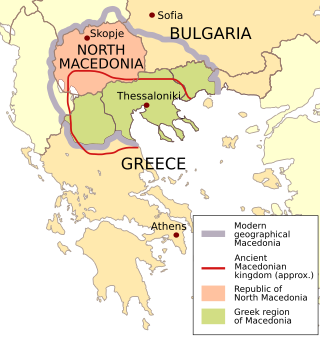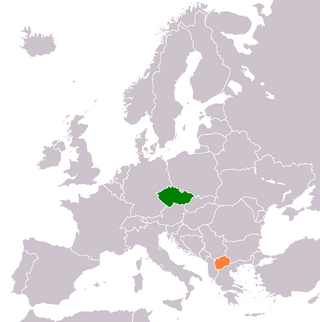The history of North Macedonia encompasses the history of the territory of the modern state of North Macedonia.

The foreign relations of North Macedonia since its independence in 1991 have been characterized by the country's efforts to gain membership in international organizations such as NATO and the European Union and to gain international recognition under its previous constitutional name, overshadowed by a long-standing, dead-locked dispute with neighboring Greece. Greek objections to the country's name had led to it being admitted to the United Nations and several other international fora only under the provisional designation Former Yugoslav Republic of Macedonia until its official and erga omnes renaming to North Macedonia, a name under which it is now universally recognised.

The Socialist Republic of Macedonia, or SR Macedonia, commonly referred to as Socialist Macedonia, Yugoslav Macedonia or simply Macedonia, was one of the six constituent republics of the post-World War II Socialist Federal Republic of Yugoslavia, and a nation state of the Macedonians. After the transition of the political system to parliamentary democracy in 1990, the Republic changed its official name to Republic of Macedonia in 1991, and with the beginning of the breakup of Yugoslavia, it declared itself an independent country and held a referendum on 8 September 1991 on which a sovereign and independent state of Macedonia, with a right to enter into any alliance with sovereign states of Yugoslavia was approved.

The Macedonian national handball team is the national handball team of North Macedonia. The team is run by the Macedonian Handball Federation, the governing body of handball in North Macedonia. Prior to joining the International Handball Federation in 1991 as an independent country, North Macedonia was represented within the Yugoslavia men's national handball team.

The use of the country name "Macedonia" was disputed between Greece and the Republic of Macedonia between 1991 and 2019. The dispute was a source of instability in the Western Balkans for 25 years. It was resolved through negotiations between the two countries, mediated by the United Nations, resulting in the Prespa Agreement, which was signed on 17 June 2018. Pertinent to its background is an early 20th-century multifaceted dispute and armed conflict that formed part of the background to the Balkan Wars. The specific naming dispute, although an existing issue in Yugoslav–Greek relations since World War II, was reignited after the breakup of Yugoslavia and the newly-gained independence of the former Socialist Republic of Macedonia in 1991. Since then, it was an ongoing issue in bilateral and international relations until it was settled with the Prespa agreement in June 2018, the subsequent ratification by the Macedonian and Greek parliaments in late 2018 and early 2019 respectively, and the official renaming of Macedonia to North Macedonia in February 2019.

The military history of North Macedonia spans from the beginning of World War II until the conflict with ethnic Albanian militants, such as the 2001 Macedonia conflict. The country also contributed troops in the War on Terror.

North Macedonia first competed as an independent nation at the Olympic Games at the 1996 Summer Olympics, then as the "former Yugoslav Republic of Macedonia", and has participated in every Summer Olympic Games and Winter Olympic Games since then. Previously, until 1988, Macedonian athletes competed for Yugoslavia, and in 1992 as Independent Olympic Participants. The provisional appellation of "former Yugoslav Republic of Macedonia" was used until 2018, in the context of the Macedonia naming dispute.

Ilirida or the Republic of Ilirida is a proposed state in the western regions of North Macedonia, declared twice by the politician Nevzat Halili, once in 1992 and again in 2014. The proposal has been declared unconstitutional by the Macedonian government. The secessionist concept of Ilirida emerged in the early 1990s and was advocated by some Albanian politicians as a solution to concerns and disputes the Albanian community had regarding constitutional recognition and minority rights within Macedonia.

The Identity card of North Macedonia is a compulsory identity document issued in North Macedonia. The document is issued by the police on behalf of the Ministry of Interior.

The accession of North Macedonia to the European Union has been on the current agenda for future enlargement of the EU since 2005, when it became an official candidate for accession. The Republic of Macedonia submitted its membership application in 2004, thirteen years after its independence from Yugoslavia. It is one of nine current EU candidate countries, together with Albania, Bosnia and Herzegovina, Georgia, Moldova, Montenegro, Serbia, Turkey and Ukraine.

North Macedonia, officially the Republic of North Macedonia, is a landlocked country in Southeast Europe. It shares land borders with Greece to the south, Albania to the west, Bulgaria to the east, Kosovo to the northwest and Serbia to the north. It constitutes approximately the northern third of the larger geographical region of Macedonia. Skopje, the capital and largest city, is home to a quarter of the country's population of 1.83 million. The majority of the residents are ethnic Macedonians, a South Slavic people. Albanians form a significant minority at around 25%, followed by Turks, Roma, Serbs, Bosniaks, Aromanians and a few other minorities.

North Macedonia–Russia relations are bilateral relations between the Republic of North Macedonia and the Russian Federation. North Macedonia has an embassy in Moscow and a consulate in St. Petersburg, while Russia has an embassy in Skopje and consulates in Bitola and Ohrid. Chargé d'Affaires of North Macedonia in Moscow is Olivera Čauševska-Dimovska, while the Russian ambassador in Skopje is Sergey Bazdnikin.

Both Montenegro and the Republic of North Macedonia are full members of the Council of Europe and of the NATO. The Foreign Ministry of North Macedonia states the two countries have excellent political ties, without any open issues between the two countries. The embassy of North Macedonia to Montenegro is located in the capital city of Podgorica. Montenegro's embassy in North Macedonia is also located in the country's capital city, which is Skopje. Also, Montenegro has an honorary consulate in the city of Bitola.

North Macedonia–Serbia relations are bilateral relations between the Republic of North Macedonia and the Republic of Serbia. A 2022 poll conducted found that the citizens of North Macedonia consider Serbia to be their friendliest state.

Czech Republic–North Macedonia relations refers to the bilateral political relations between the Czech Republic and the Republic of North Macedonia. North Macedonia has an embassy in Prague, whilst the Czech Republic has a consular agency in Skopje. Both countries are members of the Council of Europe, and NATO. Also Czech Republic is an EU member and North Macedonia is an EU candidate.

Bilateral relations exist between Greece and North Macedonia. Greece has an embassy in Skopje, and a Consulate General in Bitola. Similarly, North Macedonia maintains an embassy in Athens, and a consulate-general in Thessaloniki. Both countries are members of the Council of Europe and NATO. Greece is an EU member and North Macedonia is an EU candidate.

Republic of Macedonia, under the name of the Former Yugoslav Republic of Macedonia, competed at the 2016 Summer Olympics in Rio de Janeiro, Brazil, from 5 to 21 August 2016.

India–North Macedonia relations are the bilateral relations between India and North Macedonia.

Australia–North Macedonia relations are the bilateral relation between Australia and North Macedonia. Australia is accredited to North Macedonia from its embassy in Belgrade, Serbia and maintains an honorary consulate in Skopje. North Macedonia has an embassy in Canberra and has a consulate-general in Melbourne.
















